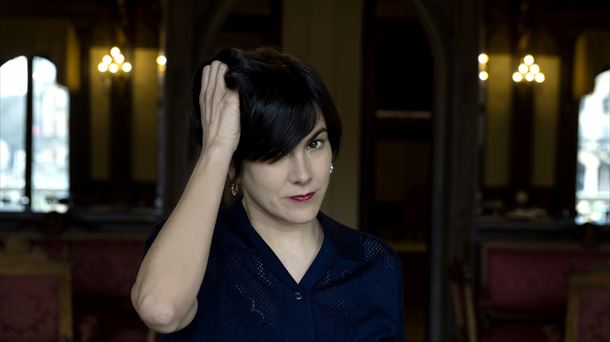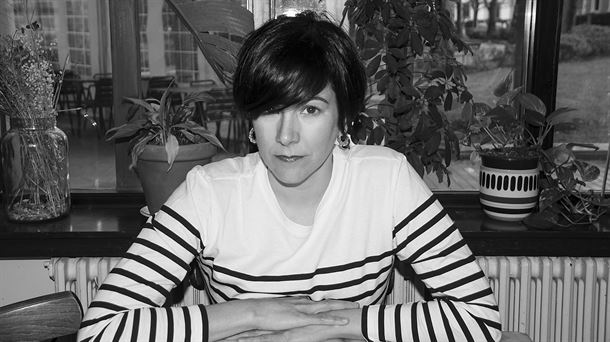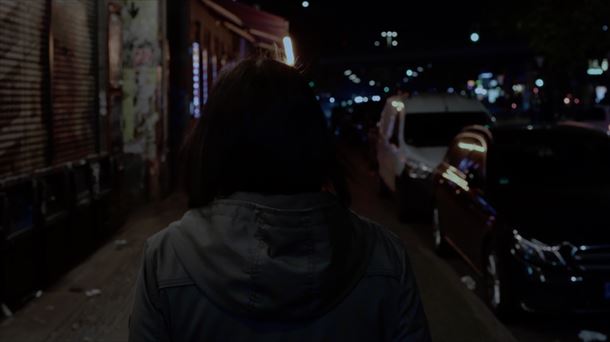On October 4, 2007, the National Police arrested in Segura a Arantza Santesteban (Pamplona, 1979) and 22 other people, accused of a crime of terrorism for their activity in the Batasuna political party. After that arrest, Santesteban spent 918 nights imprisoned in different prisons. “918 gau” is a cinematographic account of the experiences, reflections, hopes and disappointments lit up, emerged, paled, consummated and transformed in that confinement; a political, poetic, honest and suggestive film in the first person, which stirs up stereotypes.
With scarce but effective resources, in “918 gau” Santesteban films the restlessness through voiceover, memory, photos and videos, official documents and some intense scenes, to take the public to the edge of the precipice and invite them to reflect beyond emotions: militancy, ways to carry out that militancy , epic, fragility, heroism, the weight of exemplarity, the body, contradictions, the challenge of questioning some imaginaries that support many established attitudes, strength and weakness, the clash or fusion between our inherited vision of the world and the one we have to develop…
The filmmaker from Pamplona escapes in “918 gau” from formalities, both on a formal level, where dilutes the conventions about genres, prescriptions and methodsas in the background, where this award-winning documentary flees from the epic and comfort to talk about doubts and daily discomforts, something closer and more urgent, despite its complexity, than ostentatious stories written in capital letters. They already have wide and comfortable ways to make themselves heard.
We have spoken with Santesteban about this “attempt to translate my personal and political evolution into film language.”
In 2020, when the film was still unfinished, you told me that you were looking forward to seeing how “918 gau” was received by the European film industry, insofar as it is “your own vision of the conflict formulated in an experimental cinematographic language”. It is obvious that they have received it with pleasure. Did this reception outside surprise you? What do you think has been the key?
The international tour of the film has been very nice. In the team we had great expectations regarding the path that a film like this could have, and it has been received even better than we had imagined.
It is a modest film, made by a small team. In the formal aspect, I have taken several risks, and, finally, it has been a difficult film to classify. From that premise, I thought it would be difficult to move it, but I think that the key could have been precisely that, that it is a very special film.
Now, it’s your turn to present the film at home, in Pamplona. Do you think that because of the influence the conflict has had on all of us, the film will be viewed differently or will receive a different look?
Of course, the audience here has had a closer relationship with some of the situations that are told in the film, and, in that respect, they may have a different approach to the film. In any case, I think that the main starting point of this film is not to establish a story about political conflict.
In this film, my intention has been to translate my personal and political evolution into cinematographic language. I have thought a lot about how to reflect in a film a series of concrete feelings: “what is the form of doubt and discomfort from a cinematographic point of view?”.
That is why I say that the film is not designed above all from the point of view of content, although it is undeniable that the prison and the political situation have their place. It is more thought from a formal aspect.
The film deals in various fragments with the subject of expectations (“People wanted to believe that I was going to continue to fulfill their expectations”; “I don’t pretend to be anyone’s heroine”…). To what extent are the expectations of others an incentive to act and to what extent do they imply burdens and obstacles to break inertia?
It’s a profound question, and I think it’s very much a very human question. One of the concerns of the modern human being is how he appears in the eyes of others; many times our mirror is the others, for better and for worse.
In any case, my intention has been to examine what influence the instituted narratives have had on the people who have had militant experiences in the context of the Basque conflict. A lot of epics have been built following a long tradition of struggle, and I wanted to analyze from my own discomfort how that imaginary has built us
In my case, I have wondered to what extent a place has offered me –offers me– that imaginary place and to what extent has it entered into contradictions with myself when different experiences have begun to accumulate in me. At the end of the day, if the film defends any thesis, it would be this: we are made up of imaginaries, but I think that we must question the doubts, confrontations and disagreements that they generate in us in the face of these images.

Arantza Santesteban. Photo: Gorka Beunza.
Precisely, the film is an artifact against reaffirmation and inertia, a creation with a vocation to question stereotypes. Do you think there are many expressions (films, books, musical creations, speeches) of allegedly progressive ideology that reaffirm stereotypes?
I recently participated in a conference on Basque culture in which an interesting and, I think, significant debate took place: according to the most widespread opinion, Basque culture, being a minority culture, should not deal with unpleasant things – or ugly, or painful – nor produce artistic or cultural works that can only be accepted by a minority audience.
I do not think so. I understand that Basque productions have to compete with content mainstream but, from the point of view of cultural survival, if Basque culture with all its variants does not help us to think of the world around us from crudeness and doubt, then it will somehow become folklore.
That strikes me as very much a conservative view. A culture that satisfies and excites everyone assures you the public, repeats the stereotype over and over again; however, culture has to serve to remove all the corners and turn everything upside down.
Along these lines, “918 gau” underlies a commitment to suggest and not guide the viewer. How much erasing work, restraining emotion and stepping on the brakes so as not to show too much, was there during the writing and editing phases?
Yes, it was clear to me that I did not want to direct the viewer towards emotion. She preferred to make them share that feeling of discomfort that she mentioned, and offer the public a space to think, be surprised and, why not, get lost in the film. Without a doubt, that has been the hardest task: getting the tone right.
I’ve erased quite a bit, yes, but I’ve done it painlessly. This film is not made from the attachment to my personal experience, so it has not been difficult for me to make cuts or other changes.
Upon her release from prison, the film’s protagonist claims a certain anonymity; she does not do it to disappear, but to contribute from a freer place. However, she later explores her private life in the eyes of everyone throughout the film. Has that degree of exposure caused you vertigo?
Yes, I feel a kind of awkwardness about being in the movie. In any case, at a specific moment in the film I claim anonymity.
I think that at certain times anonymity is very necessary, within a militant evolution. It seems to me that it is very important to respect that anonymity in the case of “public” people or, for example, within the reception of an express person. I am in favor of that solitude, that rest or that distance, because the moment of going out into the street is very hard, inexplicable.
With everything and with that, anonymity should not be confused with, somehow, disappearing forever. I do not believe in an anonymous process that submits you forever, but in one that offers the person who has been released from prison time to reestablish himself and find his new place freely.

Arantza Santesteban
As you say, I decided to feel as free as possible in that, and this film is the contribution that records my reflections, a small contribution along the way to generate a reflection on what I understand by doing politics.
“918 gau” is, in general, a film with a slow pace, but some passages break that calm. How have you worked the rhythm of the film?
As I say, I have thought a lot about the cinematographic form of discomfort and doubt. That is what has given me the measure and the rhythm.
Another thing is that during the process I already knew that the film was not going to have a linear narrative, in the same way that my process is not linear. So I decided that the film would have a zigzagging structure, and I think that those scenes, in addition to breaking the rhythm, mark an unstable direction, that feeling of going from one place to another.
The sound is very worked. How has the collaboration with Alazne Ameztoy been?
I have had a very good sound team: Alazne Ameztoy in direct sound and Xanti Salvador in post-production. It has been a luxury working with them, and on many occasions I have followed their criteria.
The film focuses on weakness and vulnerable intimacy, two areas that both prison and a specific way of understanding militancy leave aside to the extent that they sublimate “strength.” Do you think there are reasons to think that society is moving towards a greater acceptance of weakness?
It seems to me that yes, fortunately there are cracks in the epic discourses, which claim that there are other powers around the formation of political subjectivities. Powers seem more important to me when carrying out any project, be it a political project or the planning of a small association.
Over time, I have realized that what generates adhesion and a true union with what we are doing are the things that go through us, the forces and jolts that go through our body. Sometimes, the epic narratives manage to generate that fire, and, other times, it is these same narratives that generate a great distance between the discourse and the body, the experience.
What interests me is what happens on those occasions: how to think about this kind of crisis. In those cases, fragility appears alongside strength, and I think both are necessary when we talk about commitment.

‘918 gau’
Can the film be seen in theaters outside the festivals? What future do you wish for “918 gau”?
Well, if all goes well, the theatrical release of the film will be in the fall. And I wish him the best of futures. Until now, it has given me many joys; keep it up
Do you have any more work in hand? What can you advance us?
Right now, I am finishing my doctoral thesis in Fine Arts. The intention is to deliver it at the end of the year, so that’s where I have most of my energy.
In addition, I stimulate a group of critical thinking in Tabakalera, and in the Dinamoa center we will soon publish the magazine ZIGiZAGa.
Source: Eitb
Mario Twitchell is an accomplished author and journalist, known for his insightful and thought-provoking writing on a wide range of topics including general and opinion. He currently works as a writer at 247 news agency, where he has established himself as a respected voice in the industry.











